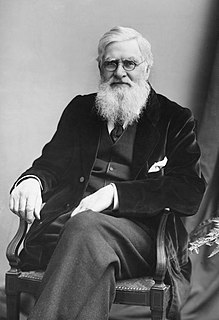A Quote by John Stuart Mill
Even if the received opinion be not only true, but the whole truth; unless it is suffered to be, and actually is, vigorously and earnestly contested, it will, by most of those who receive it, be held in the manner of a prejudice, with little comprehension or feeling of its rational grounds
Related Quotes
We have hitherto considered only two possibilities: that the received opinion may be false, and some other opinion, consequently, true; or that, the received opinion being true, a conflict with the opposite error is essential to a clear apprehension and deep feeling of its truth. But there is a commoner case than either of these; when the conflicting doctrines, instead of being one true and the other false, share the truth between them.
For in the absence of debate unrestricted utterance leads to the degradation of opinion. By a kind of Greshams law the more rational is overcome by the less rational, and the opinions that will prevail will be those which are held most ardently by those with the most passionate will. For that reason the freedom to speak can never be maintained merely by objecting to interference with the liberty of the press, of printing, of broadcasting, of the screen. It can be maintained only by promoting debate.
Discipleship is not limited to what you can comprehend – it must transcend all comprehension. Plunge into the deep waters beyond your own comprehension, and I will help you to comprehend even as I do. Bewilderment is the true comprehension. Not to know where you are going is the true knowledge. My comprehension transcends yours.
When there are rational grounds for an opinion, people are content to set them forth and wait for them to operate. In such cases, people do not hold their opinions with passion; they hold them calmly, and set forth their reasons quietly. The opinions that are held with passion are always those for which no good ground exists; indeed the passion is the measure of the holder's lack of rational conviction.
In regard to the philosophers, if they be true philosophers, i.e., lovers of truth, they should not be irritated that the earth moves. Rather, if they realize that they have held a false belief, they should thank those have shown them the truth; and if their opinion stands firm that the earth doesn't move, they will have reason to boast than be angered.
I told him the truth, that I loved him and didn't regret anything about our lives together. But do we ever 'tell the truth, the whole truth, and nothing but the truth, so help me God' as my father used to say, to those we love? Or even to ourselves? Don't even the best and most fortunate of lives hint at other possibilities, at a different kind of sweetness and, yes, bitterness too? Isn't this why we can't help feeling cheated, even when we know we haven't been?
No pains must be spared to wipe out all feeling of diffidence, embarrassment, or shame on the part of those receiving relief; [we] must be one great family of equals. The spiritual welfare of those on relief must receive especial care and be earnestly and prayerfully fostered. A system which gives relief for work or service will go far to reaching these ends.
Pascal makes no attempt in this most famous argument to show that his Roman Catholicism is true or probably true. The reasons which he suggests for making the recommended bet on his particular faith are reasons in the sense of motives rather than reasons in the sense of grounds. Conceding, if only for the sake of the present argument, that we can have no knowledge here, Pascal tries to justify as prudent a policy of systematic self-persuasion, rather than to provide grounds for thinking that the beliefs recommended are actually true.







































